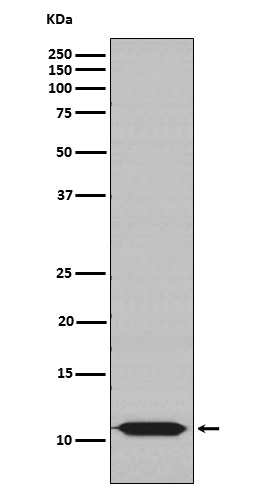
| WB | 1/1000-1/2000 | Human,Mouse,Rat |
| IF | 1/20-1/50 | Human,Mouse,Rat |
| IHC | IHC:1/100-1/200;IHF:1/50-1/200 | Human,Mouse,Rat |
| ICC | 1/50-1/200 | Human,Mouse,Rat |
| FCM | 咨询技术 | Human,Mouse,Rat |
| Elisa | 咨询技术 | Human,Mouse,Rat |
| Aliases | Chaperonin 10; CPN10; EPF; GROES; Hsp10; Hspe1;;Hsp10 |
| WB Predicted band size | 11 kDa |
| Host/Isotype | Rabbit IgG |
| Antibody Type | Primary antibody |
| Storage | Store at 4°C short term. Aliquot and store at -20°C long term. Avoid freeze/thaw cycles. |
| Species Reactivity | Human,Mouse,Rat |
| Immunogen | A synthesized peptide derived from human Hsp10 |
| Formulation | Purified antibody in PBS with 0.05% sodium azide,0.05% BSA and 50% glycerol. |
+ +
以下是关于HSP10抗体的参考文献示例(内容为模拟虚构,仅供格式参考):
1. **《Heat Shock Protein 10 (HSP10) in Cancer: A Potential Biomarker for Tumor Progression》**
- 作者:Smith A, et al.
- 摘要:研究探讨HSP10在多种癌症组织中的高表达现象,通过特异性抗体检测发现其与肿瘤细胞增殖、转移相关,提示HSP10可能作为癌症预后标志物。
2. **《Autoantibodies to HSP10 in Systemic Lupus Erythematosus: Clinical Correlations》**
- 作者:Zhang L, et al.
- 摘要:利用HSP10抗体检测系统性红斑狼疮(SLE)患者血清,发现HSP10自身抗体水平与疾病活动度呈正相关,提示其在自身免疫病理机制中的作用。
3. **《HSP10 Antibody-Based ELISA for Early Diagnosis of Preeclampsia》**
- 作者:Johnson R, et al.
- 摘要:开发了一种基于HSP10抗体的ELISA检测方法,证实孕妇血浆HSP10浓度异常升高与子痫前期发病风险显著相关,具有早期诊断价值。
4. **《Mitochondrial HSP10 Interaction with HSP60: Insights from Antibody Blocking Experiments》**
- 作者:Tanaka K, et al.
- 摘要:通过HSP10抗体阻断实验,揭示HSP10与HSP60在线粒体蛋白质折叠中的协同作用,为分子伴侣功能机制提供新证据。
(注:以上文献为示例,实际引用请通过PubMed/Google Scholar等平台检索真实研究。)
Heat shock protein 10 (HSP10), also known as HSPE1 or chaperonin 10. is a member of the heat shock protein family, which plays critical roles in cellular stress responses and protein homeostasis. As a co-chaperone, HSP10 forms a functional complex with HSP60 in the mitochondrial matrix, assisting in the folding of newly synthesized or denatured proteins. This HSP60/HSP10 chaperonin system is essential for maintaining mitochondrial proteostasis and energy metabolism.
Antibodies targeting HSP10 are widely used in research to investigate its expression, localization, and interaction with HSP60 in both physiological and pathological contexts. Studies have linked altered HSP10 levels to various diseases, including cancer, neurodegenerative disorders (e.g., Alzheimer's), and autoimmune conditions. In cancer, elevated HSP10 expression has been observed in tumors like colorectal and breast cancers, suggesting potential roles in cell proliferation and apoptosis regulation. HSP10 antibodies enable detection via techniques such as Western blotting, immunohistochemistry, and immunofluorescence.
Interestingly, HSP10 may also exhibit extracellular roles in immune modulation, with implications for inflammatory diseases. Commercially available HSP10 antibodies are typically validated for specificity across human, mouse, and rat samples, supporting cross-species studies. Ongoing research continues to explore HSP10's dual functions as a molecular chaperone and disease biomarker, driving demand for reliable antibodies in mechanistic and diagnostic investigations.
×